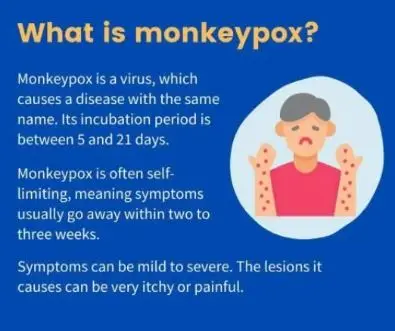Discovering the Side Effects of the Monkeypox Vaccine: What They Are and When to Seek Help? Understanding the short-lived discomfort and when it’s crucial to consult a doctor. How we can provide moral support for the patients.
What is Monkeypox?

Monkeypox is a sickness that animals, like monkeys, can have. Sometimes, people can get it too. It makes you feel sick with a fever, body pain, and a rash with spots on your skin. You might feel tired and not want to eat much. It’s not very common, but it’s important to go to the doctor if you think you have it. Washing hands and staying away from sick animals can help stop it from spreading.
What are The Monkeypox Symptoms?
Fever: Monkeypox symptoms include a fever, which makes you feel hot.
Headaches: You might get headaches, which are like a pain in your head.
Muscle Pain: Muscle aches mean your body might feel sore or hurt.
Rash: The rash has raised bumps or spots on your skin, like tiny lumps.
Tiredness: Feeling tired means you might want to rest a lot and feel sleepy.
Changes in Appetite: When you have Monkeypox, you might not feel hungry and might not want to eat.
Monkeypox Duration of Symptoms
The duration of monkeypox symptoms typically ranges from about 2 to 4 weeks. During this time, someone with monkeypox may experience fever, headaches, muscle aches, and the rash with bumps or spots on their skin. Usually, the symptoms start to improve after a few weeks, but it’s essential to see a doctor for proper care and to make sure the illness gets better.
Monkey Pox Vaccine Side Effects
The side effects of the vaccine can vary from person to person. Common side effects may include soreness, redness, or swelling at the injection site. Some people might also experience fever, headache, muscle aches, or feeling tired. Serious side effects are rare but could include allergic reactions. It’s important to discuss any concerns about vaccine side effects with a healthcare professional.
Monkeypox Vaccine Common Side Effects
Common side effects of the monkeypox vaccine can include:
- Soreness, redness, or swelling at the injection site
- Fever
- Headache
- Muscle aches
- Feeling tired or fatigued
These are often mild and go away on their own after a few days. If someone experiences severe or concerning side effects after vaccination, it’s essential to seek medical advice.
Read More: New Strains of Coronavirus
Monkeypox Vaccine Side Effects How Long
Typically, the side effects of the monkeypox vaccine, like soreness at the injection site or mild fever, might last a few days. They usually go away on their own without needing any specific treatment. If someone experiences severe or unusual side effects, it’s important to seek medical advice promptly.
Monkeypox Precautions
During monkeypox outbreaks, it’s important to take some precautions:
Avoid contact: Stay away from animals that might carry the virus.
Hand hygiene: Wash hands often with soap and water, especially after touching animals or their products.
Isolation: If someone is sick with monkeypox, it’s essential to limit contact with others to prevent the spread of the virus.
Protection: Wearing gloves and protective clothing while handling animals can reduce the risk of transmission.
How to Recover After Monkeypox?
To regain health after monkeypox:
Rest: Get plenty of rest to help your body recover.
Stay Hydrated: Drink lots of fluids like water or juice to stay hydrated.
Healthy Eating: Eat nutritious foods like fruits, vegetables, and proteins to help your body heal.
Follow Medical Advice: Take any prescribed medications and follow the doctor’s instructions.
Monitor Symptoms: Keep an eye on any lingering symptoms and report them to your doctor.
Gradual Return to Activity: Ease back into your regular activities slowly as you start feeling better.
How We Can Support Monkeypox Patients?
Supporting someone with monkeypox involves:
Emotional Support: Offer comfort and reassurance as they recover.
Practical Help: Assist with daily tasks if needed, like cooking or running errands.
Encouragement: Motivate them to follow medical advice and take prescribed medications.
Isolation Support: If they need to isolate, stay connected through calls or messages to reduce loneliness.
Information: Share accurate information about monkeypox to ease concerns and promote understanding.
Respect Boundaries: Follow guidelines on visitation or contact to prevent the spread of the virus and respect their need for rest.
FAQs:
1. Can monkeypox be prevented? Monkeypox can be prevented by avoiding contact with sick animals and practicing good hygiene, like frequent handwashing.
2. Is monkeypox deadly? In most cases, monkeypox is not deadly, and people usually recover with proper care and treatment.
3. Can you get Monkeypox more than once? It’s rare, but it’s possible to get Monkeypox more than once.
Conclusion:
Mpox, though uncommon, requires attention to prevent its spread. Through awareness, precautions, and proper care, recovery is possible. Supporting those affected with understanding and care is crucial for their well-being.

